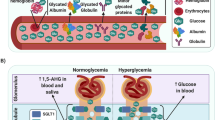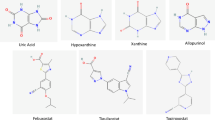Abstract
Increased platelet turnover and high level of reticulated platelets are associated with low response to antiplatelet therapy in diabetes mellitus type 2. This study evaluated association between percentage of reticulated platelets (%RP) and the response to antiplatelet therapy in patients with type 2 diabetes mellitus (T2DM). This prospective, pilot, case–control, clinical trial included 79 subjects stratified in three groups: group I included 30 patients with T2DM, group II included 34 non-diabetic patients and 15 healthy age and sex matched healthy volunteers were enrolled in control group. Platelet response to clopidogrel and aspirin was assessed by Multiplate® aggregometry analyzer. Individual response to dual antiplatelet therapy was estimated by the percentage of decrease in overall platelet aggregability (%DPA) obtained after antiplatelet therapy, calculated by presented formulas: %DPAadp = 100 × (1 − ADP/TRAP) and %DPAaspi = 100 × (1 − ASPI/TRAP). %RP was significantly higher in diabetics, than in non-diabetics, (3.17 ± 1.26 vs. 2.39 ± 1.56; p < 0.05). Significantly lower response to clopidogrel (31.55 ± 13.02 vs. 50.24 ± 11.38; p < 0.001) and aspirin (52.33 ± 22.67 vs. 64.31 ± 16.47; p < 0.05) therapy was observed in diabetics. %RP negatively correlated with response to clopidogrel therapy, but positively with metabolic profile indicators in diabetics (p < 0.05, all). Correlation of %RP with metabolic profile indicators and poor response to antiplatelet therapy suggest that altered metabolic profile can affect platelet turnover in T2DM leading to low responsiveness to antiplatelet therapy in these patients.



Similar content being viewed by others
References
Ferreiro JL, Gomez-Hospital JA, Angiolillo DJ (2009) Platelet abnormalities in diabetes mellitus. Diabetes Vasc Dis Res 7(4):251–259
Angiolillo DJ, Shoemaker SB, Desai B et al (2007) Randomized comparison of a high clopidogrel maintenance dose in patients with diabetes mellitus and coronary artery disease: results of the optimizing antiplatelet therapy in diabetes mellitus (OPTIMUS) study. Circulation 115:708–716
Gurbel PA, Tantry US (2007) Clopidogrel resistance? Thromb Res 120:311–321
Vlachojannis GJ, Dimitropoulos G, Alexopoulos D (2011) Clopidogrel resistance: current aspects and future directions. Hellenic J Cardiol 52:236–245
Kakouros N, Rade JJ, Kourliouros A, Resar JR (2011) Platelet function in patients with diabetes mellitus: from a theoretical to a practical perspective. Int J Endocrinol. doi:10.1155/2011/742719
Ferreiro JL, Angiolillo DJ (2011) Diabetes and antiplatelet therapy in acute coronary syndrome. Circulation 123:798–813
Giusti B, Gori AM, Marcucci R, Saracini C, Vestrini A, Abbate R (2010) Determination to optimize response to clopidogrel in acute coronary syndrome. Pharmacogenomics Pers Med 3:33–50
Angiolillo DJ, Ferreiro JL (2010) Platelet adenosine diphosphate P2Y12 receptor antagonism: benefits and limitations of current treatment strategies and future directions. Rev Esp Cardiol 63(1):60–76
Ibrahim H, Nadipalli S, DeLao T, Guthikonda S, Kleiman NS (2012) Immature platelet fraction (IPF) determined with an automated method predicts clopidogrel hyporesponsiveness. J Thromb Thrombolysis 33:137–142
Guthikonda S, Lev EI, Patel R et al (2007) Reticulated platelets and uninhibited COX-1 and COX-2 decrease the antiplatelet effects of aspirin. J Thromb Haemost 5:490–496
Guthikonda S, Alviar CL, Vaduganathan M et al (2008) Role of reticulated platelets and platelet size heterogeneity on platelet activity after dual antiplatelet therapy with aspirin and clopidogrel in patients with stable coronary artery disease. JACC 52(9):743–749
Hoffmann JJ (2014) Reticulated platelets: analytical aspects and clinical utility. Clin Chem Lab Med 52(8):1107–1117
Hoffman JJ, van den Broek NM, Curvers J (2013) Reference intervals of reticulated platelets and other platelet parameters and their associations. Arch Pathol Lab Med 137:1635–1640
Wurtz M, Wulff LN, Grove EL, Kristensen SD et al (2012) Influence of renal function and platelet turnover on the antiplatelet effect of aspirin. Thromb Res 129:434–440
Larsen SB, Grove EL, Hvas A-M, Kristensen SD (2014) Platelet turnover in stable coronary artery disease—Influence of thrombopoietin and low-grade inflammation. PLoS One 9(1):e85566. doi:10.1371/journal.pone.0085566
Lee EY, Kim SJ, Song YJ, Choi SJ, Song J (2013) Immature platelet fraction in diabetes mellitus and metabolic syndrome. Thromb Res 132:692–695
Gremmel T, Kopp CW, Seidinger D et al (2013) Impact of diabetes on platelet activation in different manifestations of atherosclerosis. Swiss Med Wkly 143:w13800
Vaduganathan M, Alviar CL, Arikan ME (2008) Platelet reactivity and response to aspirin in subjects with the metabolic syndrome. Am Heart J 156(5):1002-e1
Acknowledgment
The authors state no potential conflict of interest.
Author information
Authors and Affiliations
Corresponding author
Rights and permissions
About this article
Cite this article
Mijovic, R., Kovacevic, N., Zarkov, M. et al. Reticulated platelets and antiplatelet therapy response in diabetic patients. J Thromb Thrombolysis 40, 203–210 (2015). https://doi.org/10.1007/s11239-014-1165-3
Published:
Issue Date:
DOI: https://doi.org/10.1007/s11239-014-1165-3




